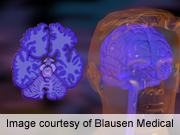
WEDNESDAY, Aug. 15 (HealthDay News) — Researchers have uncovered more evidence that certain types of delays in brain development seem to be related to a heightened risk for attention-deficit hyperactivity disorder (ADHD).
A new study appearing in the current issue of the journal Biological Psychiatry found that development of the cortical surface — which covers the region of the brain known as the cerebral cortex — was slower in children with ADHD.
This complements previous research from the same team of scientists that found normal childhood thickening of the cerebral cortex also is delayed in the brains of children with ADHD.
At this point, the findings have no clinical implications but they may one day help point to genes that control the timing of brain development, said study author Philip Shaw, head of the Neurobehavioral Clinical Research Section at the National Human Genome Research Institute.
That, in turn, may lead to new insight into how to help kids with ADHD.
“This is more about understanding the causes and the underlying changes in the brain that happen with ADHD,” added Jennifer Vannest, assistant professor of neurology at Cincinnati Children’s Hospital. Vannest was not involved with the study.
Shaw and his colleagues did multiple brain-imaging scans of 234 children with ADHD and 231 normally developing children who served as controls. Scans began when the children were about 10 years old and continued until they were 17.
Kids with ADHD did not reach “peak” development in the cortical surface until 14.6 years of age, compared with 12.7 years in normally developing kids.
“In healthy kids, the surface of the gray matter — the cortex — increases during adolescence, reaches a peak, then stabilizes into adult dimensions,” Shaw explained.
This report, added to the previous findings on cortical thickness, suggest that the same mechanisms may govern development of different areas of the brain. At this point, however, it is unclear what those mechanisms might be.
The finding also may help settle the ongoing question of whether ADHD is due in part to a delay in development processes or whether it is due to a complete derailing of typical development, Shaw said.
“We find that the overall pattern or sequence in which different parts of the brain [mature] was quite similar between kids with ADHD and those who didn’t have ADHD, but just a bit delayed,” Shaw said. “In kids with ADHD, the regions in which this delay was most prominent was in brain centers responsible for action and attention.”
The study did have some limitations. The researchers were not able to study whether medications for ADHD might have had an effect on brain development, nor did they have enough participants to see if there were differences between boys and girls.
And, although the study showed an association, it did not prove a cause-and-effect linkage.
“This certainly is not the whole story of ADHD, but a delay in this structure of the cortex might be part of the story of ADHD,” Shaw said.
More information
The National Institute of Mental Health has more on ADHD.

